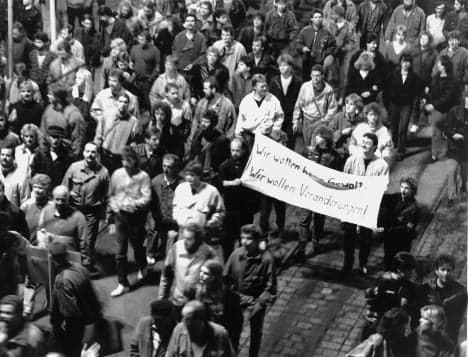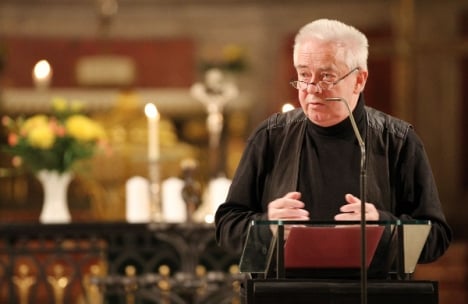Leipzig marks Monday Demo anniversary

Thursday marks the 25th anniversary of the peaceful protests in Leipzig that paved the way to the demolition of the Berlin Wall. The city will celebrate with a recreation of the iconic candlelit march that marked the beginning of the end.
"Without October 9, there would be no November 9. Before unity, came freedom," said President Joachim Gauck in Leipzig on Thursday.
European leaders and former dissidents are in the city to mark the demonstrations that happened on Mondays in the Autumn of 1989. The 70,000-strong Monday Demonstration on October 9, then the largest turnout to date, met with stunned disbelief from the East German authorities and Soviet troops. It proved a turning point after months of unrest, which had sparked fears of a bloody crackdown on the order of Tiananmen Square in Beijing that June.
People had begun gathering around the Nikolai Church and demanding change on September 4.
The protestors chanted "no violence" and "we are the people" in a rebuke to the leaders of the so-called "people's republic". The chants took hold across the country of 17 million demanding more freedom.
"The [German Democratic Republic] was a wrongful state, there was no independent judiciary. Arbitrariness ruled the country," Gauck told listeners at the Gewandhaus concert hall in Leipzig.

Guack also paid tribute to the demonstrators' courage.
"They were familiar with the arrogance of power - an order to shoot would in no way have been unthinkable. But they came anyway. Tens of thousands overcame their fear of the oppressors because their longing for freedom was bigger. The overwhelmed authorities put down their guns before the overwhelming masses."
Gauck was a pro-democracy pastor in East Germany. The politically-active Protestant Church played an important role in the people's revolution that started the domino effect on the Soviet Union. Large numbers of people were able to gather there away from the eyes and ears of the East German police, the Stasi.

Thousands have gathered outside Nikolaikirche to mark the anniversary. All the talk is of what might have happened if those 70,000 didn't go out into the streets on October 9th 1989.
"It was a miracle, just a miracle," said one man of the fact that shots were not fired and the revolution was allowed to progress peacefully. "We wanted our freedom, freedom of movement, freedom of expression and freedom for our 18-year-old daughter." Erhard Lorenz, 72, who took part in later demonstrations said. "I thought immediately, this is irreversible," artist Matthias Buechner,61, told AFP, recalling the images of soldiers and police officers simply watching the demonstration in shock. Leaders from Poland, the Czech Republic, Slovakia and Hungary, as well as dozens of former activists are in the city for the anniversary. Also on hand are former US secretaries of state, James Baker and Henry Kissinger.
The leaders were to gather later at Saint Nicholas Church for prayers for peace, whose weekly occurrence at the same site 25 years ago led by the late firebrand pastor Christian Führer, who died in June of this year, helped touch off the popular movement.

Commemorations will culminate with a recreation of the iconic dusk procession, images of which went around the world in 1989, signalling a new wind was blowing in East Germany.
The opening of the Berlin Wall on November 9 brought the long-demanded liberty to travel for Easterners and would usher in the end of the regime, and Germany's reunification the following October.
With reunited Germany now led by two easterners, Chancellor Angela Merkel and Gauck, the country still sees unification as a work in progress, despite growing economic and social equality between its two halves.
Comments
See Also
"Without October 9, there would be no November 9. Before unity, came freedom," said President Joachim Gauck in Leipzig on Thursday.
European leaders and former dissidents are in the city to mark the demonstrations that happened on Mondays in the Autumn of 1989. The 70,000-strong Monday Demonstration on October 9, then the largest turnout to date, met with stunned disbelief from the East German authorities and Soviet troops. It proved a turning point after months of unrest, which had sparked fears of a bloody crackdown on the order of Tiananmen Square in Beijing that June.
People had begun gathering around the Nikolai Church and demanding change on September 4.
The protestors chanted "no violence" and "we are the people" in a rebuke to the leaders of the so-called "people's republic". The chants took hold across the country of 17 million demanding more freedom.
"The [German Democratic Republic] was a wrongful state, there was no independent judiciary. Arbitrariness ruled the country," Gauck told listeners at the Gewandhaus concert hall in Leipzig.

Guack also paid tribute to the demonstrators' courage.
"They were familiar with the arrogance of power - an order to shoot would in no way have been unthinkable. But they came anyway. Tens of thousands overcame their fear of the oppressors because their longing for freedom was bigger. The overwhelmed authorities put down their guns before the overwhelming masses."
Gauck was a pro-democracy pastor in East Germany. The politically-active Protestant Church played an important role in the people's revolution that started the domino effect on the Soviet Union. Large numbers of people were able to gather there away from the eyes and ears of the East German police, the Stasi.

Thousands have gathered outside Nikolaikirche to mark the anniversary. All the talk is of what might have happened if those 70,000 didn't go out into the streets on October 9th 1989.
Leaders from Poland, the Czech Republic, Slovakia and Hungary, as well as dozens of former activists are in the city for the anniversary. Also on hand are former US secretaries of state, James Baker and Henry Kissinger.
The leaders were to gather later at Saint Nicholas Church for prayers for peace, whose weekly occurrence at the same site 25 years ago led by the late firebrand pastor Christian Führer, who died in June of this year, helped touch off the popular movement.

Commemorations will culminate with a recreation of the iconic dusk procession, images of which went around the world in 1989, signalling a new wind was blowing in East Germany.
The opening of the Berlin Wall on November 9 brought the long-demanded liberty to travel for Easterners and would usher in the end of the regime, and Germany's reunification the following October.
With reunited Germany now led by two easterners, Chancellor Angela Merkel and Gauck, the country still sees unification as a work in progress, despite growing economic and social equality between its two halves.
Join the conversation in our comments section below. Share your own views and experience and if you have a question or suggestion for our journalists then email us at [email protected].
Please keep comments civil, constructive and on topic – and make sure to read our terms of use before getting involved.
Please log in here to leave a comment.